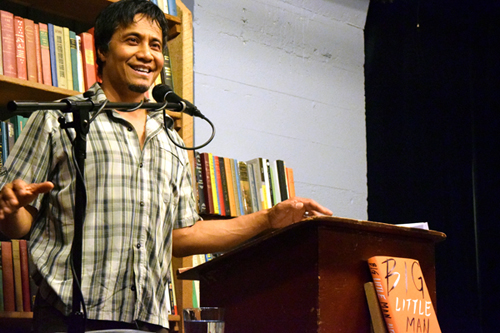By Staff
NORTHWEST ASIAN WEEKLY

Alex Tizon speaking at Elliott Bay Book Company in 2014. (Photo by Daria Kroupoderova/NWAW)
Alex Tizon, a Pulitzer Prize winner and University of Oregon (UO) journalism professor, died in his sleep of natural causes on March 23. He was found by Eugene police in his home.
Tizon was 58 years old.
Tizon immigrated to the United States from the Philippines, with his parents, in 1964. He started teaching journalism at the UO in 2011.
Prior to that, he lived in Edmonds, Wash. and was a Seattle bureau chief for the Los Angeles Times and a longtime staff writer for the Seattle Times. In 1997, Tizon, along with two other Seattle Times reporters, won the Pulitzer Prize for Investigative Reporting about substandard living conditions in federally subsidized housing for Native Americans. He also reported on the 9/11 attacks and their effects throughout the country.
Sharon Chan, the vice president of innovation, product, and development for the Seattle Times, wrote on her Facebook wall, “As a young reporter, I wanted to BE Alex Tizon — a writer of stories that could move you to tears, Asian American journalist, Pulitzer Prize winner, and so … cool.”
KING 5 anchor Lori Matsukawa wrote, “Devastated. Alex was kind and sweet, but also a dogged reporter. So, so sad.”
Tizon graduated with a degree in political science from UO and went on to earn a master’s degree in communication from Stanford University.
In addition to his newspaper career, Tizon contributed to the TV news program “60 Minutes,” co-produced a segment on mail-order brides in Asia, and freelanced for Newsweek magazine. From 2009 to 2010, Tizon returned to the Philippines as a Knight International Journalism Fellow, where he started crowdsourcing for the media to keep track of the Philippine government’s efforts to alleviate poverty in its poorest regions.
The second of nine children, Tizon faced adversity and, over time, a “realization of cultural mythologies related to race and gender, in particular the Western stereotypes of Asian men and women.” He wrote about this realization, and its many implications, in his book released in 2014, “Little Big Man: In Search of My Asian Self.”
In a 2015 interview, Tizon told Images & Voices of Hope (ivoh), “Not many journalists intend to be cultivators of hopelessness, but the accumulation of all our stories over time seems to have that effect on many people, entire communities, even on ourselves. Simply asking, ‘Might there be another way to tell the story?’ is a good start. “It takes gumption to take it a step further and ask, ‘Might there be a way to tell it that contributes meaningfully — and not just in a token way — to hope, healing, or reconciliation?’
“His death is a tragic loss not only to his family, but to the entire School of Journalism and Communication community,” journalism director Scott Maier wrote in a letter to students obtained by The Daily Emerald.
Tizon is survived by his wife, Melissa, daughters, Dylan and Maya, as well as eight siblings. A memorial service will be at 1 p.m. on April 1, at the Newport Covenant Church in Bellevue. The family says flowers can be sent there, or donations can be made to the Asian American Journalists Association.



